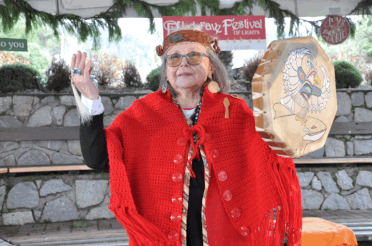A New Season, A New Hope23/9/2012 We're in the first hours of autumn, mists hang on the dewy trees in the mountain forests and the ocean breathes out the last heat of the summer into the cool early morning air. In other parts of Canada the weather already has a sharp bite, making the warmth of houses all the more welcome and the lives of people without shelter more despondent, more difficult and imperiled. The turn of the season in this "true north" has always required us to turn to each other; from Aboriginal villages to early homesteads and 21st century metropolises, the primordial message, to borrow from John Donne, is that "No man is an island/Entire of itself" through the longer, colder deeper nights of winter.
This is what makes the example of Winnipeg's Kris Doubledee so very Canadian. Driving his Route 24 bus through Portage Avenue, Doubledee saw a homeless man walking barefoot through bad weather. In Doubledee's words, "I couldn't stand seeing someone walking barefoot in this temperature like this." He pulled the bus to the curb, yelled "Hey, buddy!" and went to talk to him. When Doubledee's intentions started to become unmistakeable, his passengers took out their smart phones and shoot clips that have now gone viral: the bus driver took off his shoes and gave them to the barefoot man. The hard edge of urban life usually finds us looking the other way, sinking into a numbing hopelessness when we come face to face with the human impact of a society, a politics, a system, an economy that can leave people destitute, exposed to the unforgiving power of a Canadian winter. What makes Doubledee's example compelling is how very natural it was to step out of this homelessness, as he stepped out of his shoes in an open, generous and profoundly personal answer to the need of the other man. Doubledee would likely agree that this kind of counter cultural thing is actually happening all the time all across the country. The turn to colder weather can bring a turn in each of us to tenderness, and it can come out of nowhere. We see this every season in the Dundarave Festival of Lights. An army of firefighters arrives at Dundarave Beach to help "plant" a forest of Christmas trees. Families, schools and universities (actually, Capilano University has the distinction of being the only one so far), community choirs and Dragon Busters, businesses of every stripe sponsor a tree of their own for $110 and then make a charitable donation to the Lookout Emergency Aid Society's North Shore Shelter of $250 or more. They decorate their trees at Dundarave Beach or in Dundarave Village, and the result is arguably the world's most spectacular forest of Christmas trees. Then they encourage everyone they know to go online to their tree's pledge page, "decorating" it with more donations to the shelter. So far right off the starting blocks, first time entrant Trimetrics Physiotherapy has set the pace with a $1,000 donation to the North Shore Shelter. Presenting founder Arc'teryx, Clara Hartree, Darwin Construction, the Truffle House, Lunny Atmore Law, Penfold's Roofing, the North Shore Dragon Busters, West Van Optometry, West Van Vacuum Centre, 2M Events, 4Kats Studio along with West Vancouver's Mayor and Council (technically, the first group to sponsor a tree this year) have allowed the Festival to flourish. The race is on, and there's glory enough for all. In this way, over the past four Christmases the Dundarave Festival has allowed our community to donate over $105,000 to the North Shore Shelter. This has allowed the shelter to double its transitional support staff. The result has been miraculous. Where you might have seen one person a year make the transition from homelessness to independent life, this year eight people have found the encouragement, healing and loving support to create new lives for themselves. This season, we're celebrating West Vancouver's Centennial Christmas by raising up a forest of one hundred trees at Dundarave Beach. Every one of these trees will be a beacon against the longest nights of the year, a sign of a hope shining all the brighter because of the darkness as each tree sponsor works a miracle every bit as Canadian as Kris Doubledee's. One Christmas tree at a time, we knit closer the bonds that have allowed us to thrive in this country by making sure no one is left out in the cold.
0 Comments
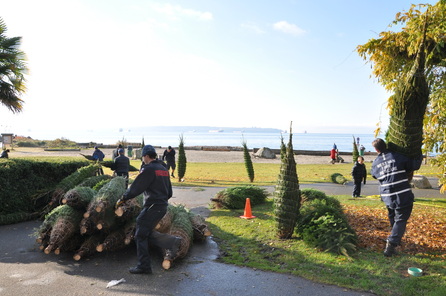 West Van's firefighters are second to none, the first on the scene when our families, our homes and everything we have are at risk of being swallowed up by the darkest turns of fate. It takes an uncommon person to make a profession out of putting everything he or she is on the line to pull us out of harms way. The fact that people choose this profession is something of a miracle. But it is in the nature of a miracle to pull us up short, to make sure if only for a moment we see the uncommon power of it, to push aside any drift to ingratitude with a sense of wonder. This is the feeling we had this morning, under a bright early winter sun on Dundarave Beach, when an army of firefighters arrived to help us plant a forest of Christmas trees. In our family, we say eagles are like angels: there are always more around than you can see. Same goes for firefighters. We were told to expect four, but two firetrucks hauled their gleaming red mass to the beach and in a heartbeat we were surrounded by the men and women of the WVFD. Mario Russell, the exclusive provider of trees for the Festival from his -- unrivaled for the excellence of its trees -- Valley View Tree Farm, had just delivered a record number of trees for the Dundarave Festival. In less than half the time it took us in previous seasons, the Firefighters raised them into a forest working side by side with Venturer Scouts, students from St. Thomas Aquinas Secondary School, École Pauline Johnson, and the Knights of Columbus. The work went swiftly because of the loving attention Chris and his crews from Great Canadian Landscaping had brought to the site the morning before, prepping the holes in a biting rain. It went swiftly because of the support the Festival's received from West Van's municipal staff. And it was finished in a twinkling because of our firefighters. These trees, in the words of the Lookout Society's eminent executive director, Karen O'Shannacery, have a "miraculous effect" on the lives of the most vulnerable people in our community. The need was unmistakable even this morning, as we arrived to find evidence that someone had passed the sub zero night sleeping under the great Alder tree at Dundarave Beach. We can measure the miracle in the $75,000 the trees have raised through three Christmases for the North Shore Shelter, and the signs that we're on our way to adding to this total. But the more reliable measure of this "miraculousness" is the way the trees make visible something that could pass without notice, the way the pull us up short and call us to a sense of wonder against the numbing ingratitude of ordinary time. They forced into plain sight our friendship, a deeper understanding of the fact that the only way we can be human is to be human together -- with each other and for each other. Putting this forest in place this morning allowed us to see -- against the evils that can happen to us without warning -- that it is a beautiful thing to be human. The 20th Anniversary of the Dundarave Festival of Lights began auspiciously, with a host of firefighters planting a forest of miracles on Dundarave Beach. Its in our hands now to answer this with generous, open and beautiful humanity. 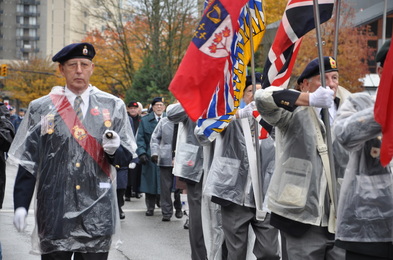 Colour Guard, Remembrance Day 2011, West Vancouver The world had never before seen the destruction of human life by human hands on the scale of this war, the world's first global war. Canada's last known World War I veteran, John Babcock, died in February, 2010 at the age of 109 years, taking with him the last living memory we have of the war that did not end all wars, but forever changed the nature of war. It brought an end to the possibility of containing war to discrete battles fought with brutal but limited weapons, ushering in an era of war on a planetary scale waged with weapons of mass destruction that target even now every human being, every living thing. It made the world incarnadine. Understanding this is essential if we are to come to terms with the significance of what men of Mr. Babcock's era, ally and enemy alike, did on the battlefield of the Ypres Salient to mark the Christmas of 1914. The fighting had commenced in October of that year. Of the 48,000 soldiers in the German Army Corps, the vast majority were young volunteers between 17 and 19 years old. This was the "child army", the "Kinderkorps". Before the arrival of the 1st Canadian Division in February 1915, to face later that spring Germany's use of deadly chlorine gas, British forces with French reinforcements and the Indian Army prevented the Germans from seizing the town of Ypres. Within the first six weeks of fighting, the allies suffered the loss of 80,000 men. On either side of the flat "no man's land", both forces struggled against heavy winter rains to dig themselves into trenches, holes the inexorable weather reduced to quagmires. Both armies were shouting distance from each other, and when they sang their music would cross no man's land sometimes to be answered by applause. Against this, General Sir Horace Smith-Dorrien, commander of the Second British Corps, issued a strict prohibition against any form of fraternization with the enemy because of "the absolute necessity of encouraging the offensive spirit of the troops." Recognizing the scale of the killing, on December 7th 1914 Pope Benedict XV proposed a global armistice to allow the celebration of Christmas. The German command agreed, but the leadership of the Allies refused. The families of soldiers on both sides sent their loved ones Christmas presents, small comforts against the killing and the cold and their homelessness in the trenches. On Christmas Eve, the Allied soldiers watched what at first might have been an especially cruel feint as the German forces, the Kindercorps, raised hundreds up of candle lit Christmas trees to the parapets of their trenches. And then they began to sing, "Stille Nacht, heilige Nacht, Alles schläft; einsam wacht [...]". The British command ordered their soldiers not to fire, but to remain vigilant. And then the British soldiers, against orders, answered with carols of their own. Both sides emerged from their trenches to shake hands, trade beer and gifts, and breathe in peace the air of this holy night. To the list of momentous things not to be forgotten this Remembrance Day, let us not forget this Christmas miracle of 1914 when the light of Christmas trees answered the challenge of a pope: to bring a generation of men at war to taste the peace of Christmas. This was a night made holy and all the sweeter because in that wilderness of the Ypres Salient they discovered the wildest thing of all: the spirit of Christmas that cannot be contained by orders, that will in a heartbeat reveal an enemy to be a friend, and restore against the barbarous logic of war the beauty of being human. For these soldiers, then, claim now a Christmas tree of your own in the Dundarave Festival of Lights. Hold them close to you when you walk the forest of Christmas trees on Dundarave Beach this Christmas Eve. War is not over; hunger, oppression and homelessness remain. It is in our hands, moved by a courage bigger than any one of us, by a spirit as ancient as it is young, to find ways to live for each other, to call each other to a deep, brave and powerful understanding of what it means to be human. 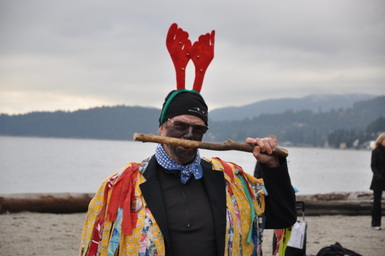 The jack o'lanterns have had their moment to shine, but in the cool light of November 1st Hallowe'en is so yesterday. We're in a fast sprint now, faster than a sleigh drawn by "eight tiny reindeer", to Christmas as you've never seen it before. In twenty-five days, on Saturday November 26th, the Dundarave Festival of Lights rolls out its 20th season. It will connect us with the eternally young face of Christmas. From ancient traditions to modern twists, bold bonfires on the beach to the intimacy of a ballad in the Festival Longhouse, all of the joy, peace and promise of the season will find us, shake us out, deepen our connections to each other and to our communities. We'll rock this Christmas by allowing the season to rock us. And we will do it together, by making sure no one is left out in the cold. Click the "Sign Me UP" button now to claim a Festival tree of your own. Use it to send your best wishes for the season, by letting your love shine out, in the Festival's forest of Christmas trees on Dundarave Beach. Your tree will reach over 65,000 people who make pilgrimages to this forest throughout the holidays. Your tree will be a beacon of hope for the hundreds of people who are homeless and at risk of homelessness in our community, by raising charitable donations to support the Lookout Emergency Aid Society's labour of love on the North Shore. And join us on Saturday November 26th for the Dundarave Christmas Fair, the launch of an unforgettably beautiful Christmas 2011, the season of love that is seeking us out even now, as the days grow shorter and the winds turn cold. 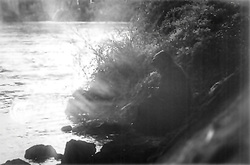 Photo credit David McNeary, Creative Commons. This week the rains of winter found us, a foretaste of a season that forecasters believe will be one of the bitterest winters we've seen in some time. The rain is falling in liquid shards; two more days of this and we'll see an early cold weather alert, which means people who are toughing it out right now in our parks and beaches, on our streets and under doorways will have somewhat greater access to shelter. The rain drives home the reality of the BC Auditor General's observation that, in 2007, the cost of providing police, ambulance, emergency hospitalization and court-related resources to contend with the human impact of homelessness cost BC taxpayers $55,000 per homeless person per year. The Auditor General compares this to the $37,000 it would cost to provide the same person with stable and supportive housing, as part of a considerable volume of evidence to support his conclusion that "the government does not have a comprehensive plan for addressing homelessness." Much has changed since since the Auditor General's 2009 report Homelessness: Clear Focus Needed. Today, there are 1,215 seniors at immediate risk of homelessness on the North Shore. The Lookout Society's eminent executive director, Karen O'Shannecery, advises us last year saw a 5% increase in the number of seniors turning to homelessness shelters and she projects this will grow to 10% within a year. This trend is likely to increase as the percentage of seniors in our community rises. At the same time, there's been a 38% increase in the numbers of youth 25 and under who have become homeless in our community since 2008. Faced with this reality, there are a number of practical and immediate steps all of us can take to end homelessness in our community. In fact, we believe this can be done beautifully. Here are two things we can do right away: First, let Christmas start today for everyone on the North Shore who's at risk of homelessness. Sponsor a Festival tree for your family, your business, community or place of worship and let it be a meaningful beacon of hope: put your tree to work now in raising the charitable donations essential for the ongoing work of the North Shore Shelter. Second, use this blog, the four Saturdays of the Festival's fabulous and free concerts and any other moment you can find for open and frank conversations about the reality of homelessness and housing insecurity in our community. These conversations could be challenging. The reason we have a shelter for homeless adults on the North Shore stems from a particularly painful conversation. She was a lady in every respect, living in a home of her own in the British Properties and well into her eighties when her neighbours found her. Her husband had died some years before, and she found his Canada Pension was not sufficient to pay her property taxes and support her. So she used that money to pay the tax, with a small amount left over to keep up appearances by paying a gardener to come in once a month and mow the lawn. Inside her home, she shut down all of the rooms and lived only in the nanny's quarters to save on utility costs. She did not fill her prescriptions. She ate cat food. Her neighbours looked in on her when they saw the junk mail piling up at her letterbox, found her in a coma and saw her admitted to Lionsgate Hospital. She had no family in Canada, and so the hospital contacted the Lookout Emergency Aid Society's offices in the Downtown Eastside, because at the time there were no shelters on the North Shore. It was the experience of an elderly West Vancouver lady with the brutality of housing insecurity and, eventually, homelessness, that set in train the creation of our own North Shore Shelter. Honour her by allowing your own Festival tree to shine in our forest of Christmas trees on Dundarave Beach. Answer her loneliness by helping us to create frank and loving conversations about how to make sure the people who built out community, and the people who are the future of our community, can always make their home among us. 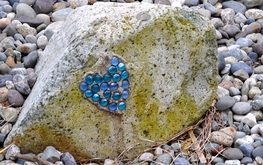 The universe has its own rhythm and reason, so it was entirely fitting that we received word this week -- as Canada turns its heart to Thanksgiving -- that the Department of Canadian Heritage has once again awarded significant funding to the Dundarave Festival of Lights. This means that we can keep the Festival's 20th Anniversary this Christmas by providing urgently needed financial support to our performing artists, allowing kids their first opportunity to sing in public and bringing the magnificence of the season as-you've-never-seen-it-before to the heart of Dundarave Beach and Dundarave Village. And it means all of us, performers and audience alike, will have warmth and shelter against the bracing weather of a North Pacific winter. This moment of thankfulness, running the three days of the long weekend, drives home the fact that to be human is to live in relationships, with others and for others. None of us would be who we are today were it not for the people who in loving us and sustaining us make us the persons we are. There are so many inducements to loneliness in our culture, especially if you're insecure in your housing or reduced to homelessness, and it often takes a conscious effort to turn our minds to the fact that every beat of our hearts is due to the hearts that made us. The blood in our veins carries the blood of our ancestors, and our sense of identity is woven through with the identities of the people who have taught us, befriended us, and loved us through our lives. So here's a way to bring this fact to light, a new Thanksgiving tradition. More and more families and community organizations (like the North Shore Dragon Busters) are using the Dundarave Festival of Lights as a beautiful and public moment to honour the people they love. Sign up for your own Festival Tree this season and let your tree shine for everyone who has loved you into being. Let your Festival Tree be a beacon of thankfulness for them, a sign of hope and encouragement for everyone who sees it. Then bring them with you to Dundarave Beach on November 26th to for the world's most spectacular tree decorating party, to celebrate together the ties that keep us human, the love and friendship that make us the people we are. 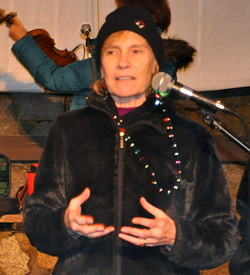 Karen speaks to a packed Festival Longhouse Karen O'Shannacery has been named to the Order of British Columbia, the highest civilian honour of our province. And we are very proud to say that Karen, the force of nature behind the Lookout Emergency Aid Society, is a friend of the Dundarave Festival of Lights. There are few British Columbians whose life work speaks so powerfully to the community we ought to be—a community that leaves no one behind, that celebrates the beauty of every human person, and refuses to treat anyone as disposable or unworthy of love. It was a powerful moment in the Festival Longhouse last season when Karen took the mike and, as only she can do it—with warmth, courage, and inspiring determination, challenged us to see the day when every bed in a homeless shelter would lead to a permanent bed. The answer to homelessness, on this reasoning, is a home. This is a happy moment for all of us to take stock of the future of our communities. The pressures of life can be so great that it takes a conscious, determined effort to think about the world as it ought to be, to ask tough questions about the ways people are pushed to the margins of our society, and then make the leap of faith necessary to make change happen. What marks Karen as a remarkable British Columbian is the courage, vision and joy she brings to this work of conscience, justice and mercy through the Lookout Emergency Aid Society. There are, to put it bluntly, hundreds of people this year on the North Shore and thousands across Metro Vancouver who would be homeless were it not for the tireless work of the Lookout Emergency Aid Society, the agency Karen helped to found. So here's to Karen O'Shannacery and the work we hold in common of making sure no one is left out in the cold.  Karen O’Shannacery has worked for more than four decades seeking solutions and providing comfort to the homeless and disenfranchised of Vancouver’s downtown eastside. Ms. O’Shannacery’s compassion for those less fortunate has led to the establishment of quality resources and housing. She has a thorough understanding of the issues, is a tireless advocate for homeless people, a respected, well-spoken leader and a team player who works across boundaries to achieve change. Among her many successes, Ms. O’Shannacery’s has created 17 housing projects, including three multi-use buildings, renovation of two single-room occupancy buildings and the opening of Antoinette Lodge, subsidized housing in Vancouver’s downtown eastside. She co-founded a provincial Shelter Network and was instrumental in the purchase and renovation of New Westminster’s former College Place night club, which now serves as a homeless shelter and transitional housing. To London with Love12/8/2011 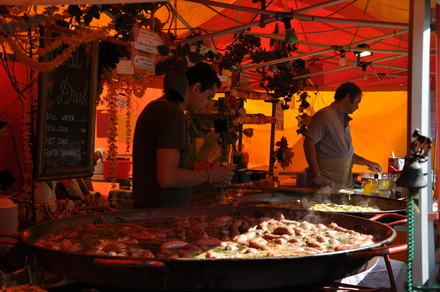 Haute cuisine street food at the Thames River Festival, steps down from the Globe Theatre. There were, on both banks of the Thames, hundreds of thousands of people taking in the warm September air last year at Thames River Festival. The scale of this Festival is in keeping with the expanse and depth of London; the strong, vibrant pulse of a city at the heart of human history. Families of every description and from every corner of the planet meandered through a maze of outdoor performance spaces, all of them free by the grace of the Mayor. Not a beer garden in sight, many if not most of the adults walked with a glass of wine or a pint in hand. No panic, no pushing, no mobs of any kind, no broken glass: this was the beautiful cosmopolitan face of a global capitol shining with the best of what it means to be alive, to be human. If you had suggested then that eleven months later we'd see some of this city's neighbourhoods ablaze, family-owned shops looted and their owners mercilessly assaulted, victims of violence robbed by people who professed to be their rescuers I would have pointed to the thousands of people around us to give you a reality check. The sense of belonging that the Thames River Festival made palpable, the pride people from every class and origin seemed to take in being free to participate, to find a new part of themselves there on the banks of the Thames made unthinkable the prospect of riots and their rapacious, tear-down-everything-and-let-it-burn violence. London, I would have said, is bigger than this. And it is. There are as of this moment tens of thousands of police on London's streets, and on urban streets throughout Britain. If they are to be released from this urgent and pressing duty, if their watch is to be temporary and not perpetual, the Thames River Festival holds the key. The world needs more of this London, because it is the London of this Festival that shows us how to find delight in encountering the total stranger. This is the London that shows us, through the exuberance and inclusiveness of its celebration of life, how not to tire of life. At a time when so many forces have uprooted us, where we float and tweet through cyberspace, get knocked around by a perilous global economy which leaves some of us (an increasing number of us) homeless, finding a sense of place is never automatic and should never be taken for granted. The Thames River Festival, and with it the Dundarave Festival of Lights, are vital moments when we make a conscious effort, a deliberate and joyful act of will that shows the greatness in each of us through the music that moves us. Festivals have always played a vital role in allowing communities to renew themselves, by deepening our relationships with each other even as they school us in how to rejoice in the fact that we belong together. So here's to London with love, here's to us. The Power of Belonging16/7/2011 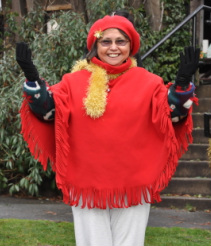 For as long as there's been a West Vancouver, families have been gathering at Dundarave Beach to play, cast a net, a line or a crab trap, or jump off the peer at high tide into bracing salt water that on a good summer might reach a balmy 19˚ C. (No chance of that, alas, this wet July as we swim through frigid sheets of February hanging in the sea.) This is the way its been for little over a hundred years, Dundarave Beach as something of a sanctuary for families. Before there was a West Vancouver, epochs back to the arrival of the First Peoples across the Bering Straight land bridge (summer reading: Jared Diamond's Guns, Germs, and Steel), this beach remained a sanctuary but in even more powerful ways. The forests were ancient and likely came down to the edge of the water then, and the tides sustained a greater array of life than they do even now. We're seeing otters about today in greater profusion, and there was the grey whale last summer that paused right in the heart of the swimming buoys; but four thousand years ago, the magnitude of life on this beach would have been almost supernatural. It surrounded and sustained the ancestors of our friends of the Squamish Nation. All of this underscores the enormity of the gesture of Wendy Charbonneau, whose many times great grandfather Chief George Capilano welcomed Captain George Vancouver to the waters off Dundarave Beach, in lifting her hands to welcome the Dundarave Festival of Lights last season. With the blessing of the Elders of the Squamish Nation, we named our principal performance space on the Beach the Festival Longhouse because, well, it is long but also because it is a place of sanctuary against the weather, a place to include everyone in celebrating the life of our community, a place to rejoice in the ways all of us belong here. In the hands of Ryan and his crew at Wildcoast Productions, the Festival Longhouse is very much a twenty-first century take on the most ancient of structures, high tension cables and structural supports for an immense white roof. Raised and then removed for each Festival weekend, the Longhouse reflects our values of human ecology in sustainability and a no-trace presence on Dundarave Beach. A big bonus, which we try never to take for granted, is Ryan's unflappable professionalism in taking our vision for the site and making it happen--the grace of the Dundarave Nativity Pavilion and its spire high above the Beach standing with the welcoming expanse of the Festival Longhouse against the worst of a Pacific coast winter. It may well feel like winter now in this flinty midsummer, but the weather calls us always to give shelter to each other, to make certain in every season we can all enjoy the comfort and power of belonging. 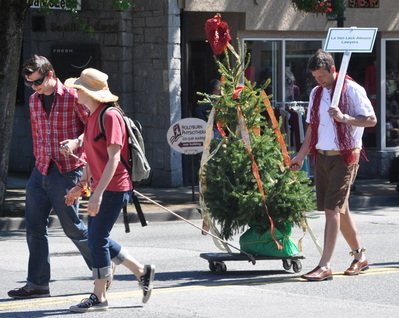 Festival Founder Tim Lack joins in at the West Vancouver Community Day Parade. Long before blogs and iPads, the festival was the original social networking platform, the place where a community would gather to take stock of itself, celebrate the best of its traditions, and renew the relationships -- one to one, family to family -- that give life meaning, security and joy. The work of the festival has always been to build community and to do so, going back to the root of the word in "feast", in a spirit "characterized by rejoicing". You can see this on the front page of this website, a sampling of the faces of the hundreds of performers and the thousands of people in their audiences who set aside the pressures of the holidays to connect with the best spirit of our community, the true spirit of the season. The experience was powerful because, as we rolled into the longest nights of the year, we gathered together in the ancient and beautiful duty of making sure no one is left out in the cold. And it was a ton of fun. Keeping the concerts free, holding them in the wheel chair accessible shelter of the beautiful Festival Longhouse and Nativity Pavilion, and timing them to make sense for the needs of families in the busiest season of the year allowed us to collect ourselves in a spirit of rejoicing because no one was left out in the cold. Thanks again, O Department of Canadian Heritage, for helping us make this possible last season. But here's the thing. Even as we work now to create the program for the Festival's 20th Anniversary this season, in the height of summer, www.dundaravefestival.com continues to log 1500 hits on its website each (way off season) month. This is a bit of a mystery because, although Morris dancers, children's choirs, massive mariachi orchestras, show tunes, and stellar folk artists are always in season, this is very much a website that celebrates the light of the Christmas season. So why the interest even through the summer months? It comes back to this fact of community, and the ordinary miracle -- to borrow again from Sarah McLachlan -- of the ways we need each other, reach out to each other and deepen in each other a sense of belonging. None of this happens automatically, and we're grateful for the love and support the Festival receives from its circle of Founders. Moving forward to our 20th Anniversary this season, we're working out new ways to keep the Dundarave Festival of Lights inspiring and inclusive. This means, first of all, keeping its concerts absolutely free. It also means tapping into the power of our forest of Christmas trees -- the only one of its kind in coastal British Columbia -- to help us end homelessness beautifully. Because no one should be left out in the cold. To find out how you can support the Festival, or to share with us your ideas for ending homelessness in our community, post a comment to this blog or contact us here. |
The Dundarave Festival Society
We are a circle of friends working in the Dundarave Festival of Lights Society to bring to life the promise of Christmas in our community, a season of life, passion and purpose that leaves no one in the cold. This is community-driven social change, in the true spirit of Christmas and the best spirit of our community. Archives
October 2014
Categories
All
|
LOVE & JOY COME TO YOU
Stay in touch!
|
|
We acknowledge with loving gratitude and respect that the Dundarave Festival is located on the unceded sovereign territories of the Skwxwú7mesh (Squamish), Səl̓ílwətaʔ/Selilwitulh (Tsleil-Waututh),and
xwməθkwəy̓əm (Musqueam) Nations. 150 25th Street West Vancouver BC We acknowledge the financial support of the Province of British Columbia.
This website uses marketing and tracking technologies. Opting out of this will opt you out of all cookies, except for those needed to run the website. Note that some products may not work as well without tracking cookies. Opt Out of CookiesCopyright © Dundarave Festival of Lights Society. All rights reserved.
|

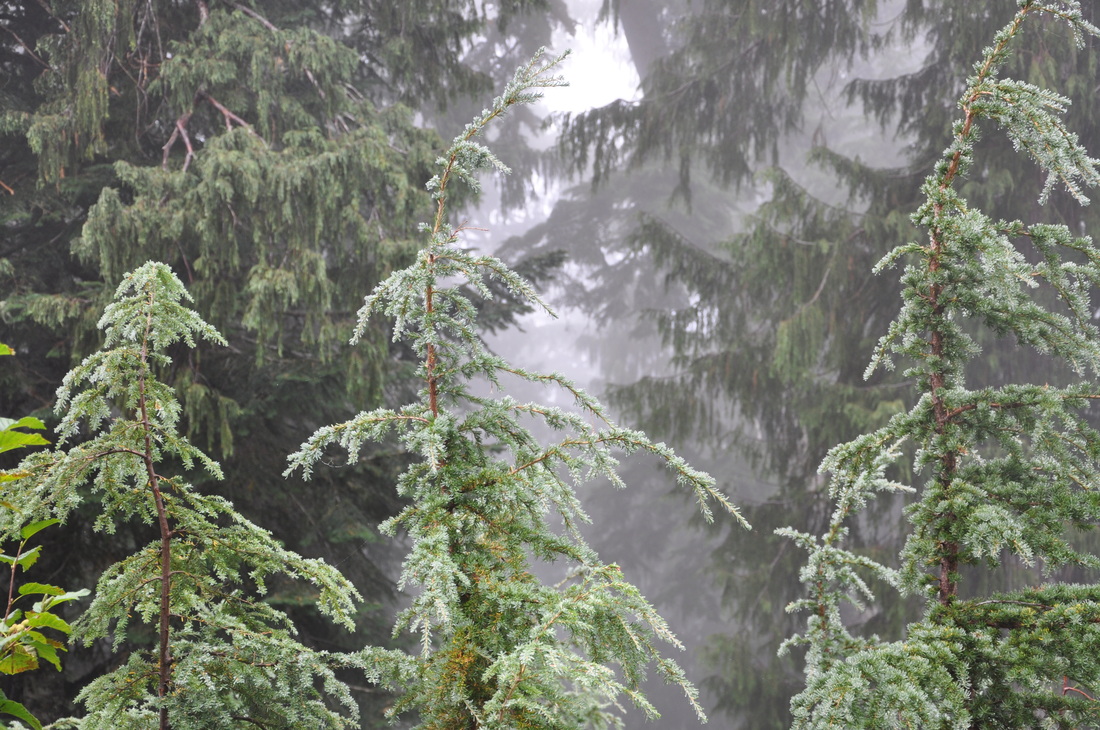
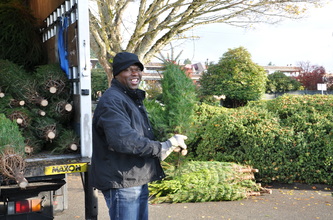
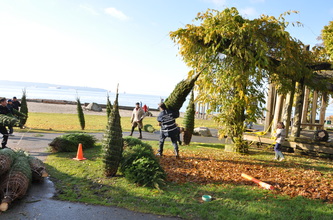
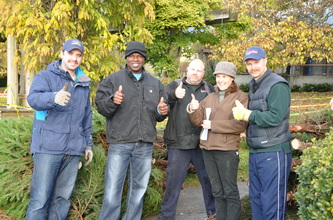
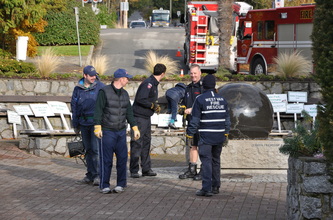
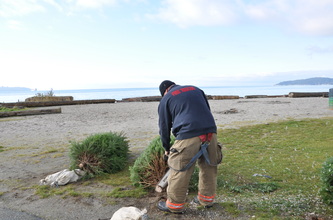
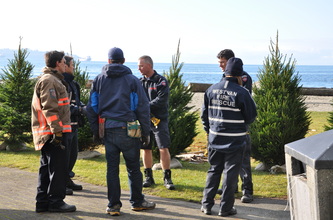
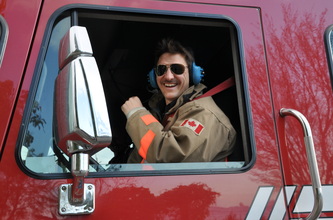
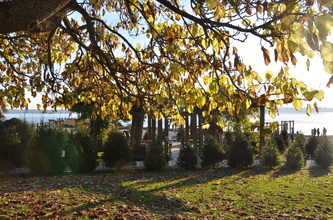
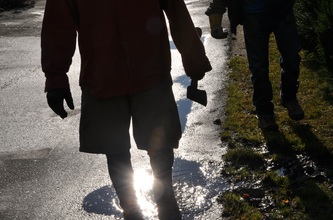

 RSS Feed
RSS Feed
